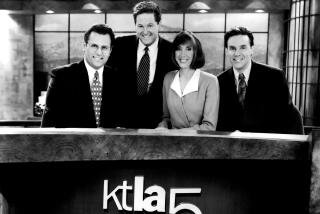‘60s Activist Jerry Rubin Dies After Auto Injuries
Jerry Rubin, the anti-war radical who once told his peers never to trust anyone over 30, died Monday night at UCLA Medical Center. He was 56.
Rubin--an inveterate rule-breaker for most of his well-publicized life--had been in intensive care since Nov. 14, when he was hit by a car while jaywalking in Westwood. Hospital officials said the Yippie-turned-businessman suffered a cardiac arrest about 7:45 p.m. and could not be resuscitated.
“He was a great life force, full of spunk, courage and wit,” state Sen. Tom Hayden (D-Santa Monica) said late Monday, adding that he was “terribly sad” to hear of Rubin’s death.
“I think his willingness to defy authority for constructive purposes will be missed,” Hayden said. “Up to the end, he was defying authority.”
Born July 14, 1938, in Cincinnati to a union organizer and his wife, Rubin was a graduate student at UC Berkeley when the anti-Vietnam war movement carried him to fame.
In the late 1960s, he founded the Youth International Party--the Yippies--with the late Abbie Hoffman and Paul Krassner, and honed his reputation as a master of political theater. Once, to protest capitalism, he dumped dollar bills on the floor of the New York Stock Exchange; another time, he campaigned to elect a pig as President of the United States.
Dressed in his trademark guerrilla chic, he cut an increasingly famous figure. But his most memorable moment as a radical came in 1968, during anti-war demonstrations outside the Democratic National Convention in Chicago.
Black Panther leader Bobby Seale and seven others--among them Rubin, Hoffman and Hayden--were charged with conspiracy to incite violence and crossing state lines with the intent to riot.
The court proceedings began in September, 1969, becoming known as the Chicago Seven trial after federal Judge Julius Hoffman severed Seale’s case from the others and ordered him bound and gagged when he protested the crusty jurist’s rulings. Seale eventually was convicted of contempt of court and sentenced to four years in prison.
The trial of the seven--Rubin, Hoffman, Rennie Davis, David Dellinger, John Froines, Hayden and Lee Weiner-became a dramatic spectacle during which the wild-haired defendants stomped on the judicial robes they elected to wear in the courtroom.
“I think it certainly was a microcosm of the times, but it also was theater, so it was an exaggerated statement of the times,” Froines said later.
After 4 1/2 months of testimony, all but Froines and Weiner were found guilty of the intent-to-riot charges. All were acquitted of the conspiracy charges.
Although Rubin, Hoffman, Davis, Dellinger and Hayden were sentenced to prison, their convictions--along with Seale’s--were overturned by the U.S. 7th Circuit Court of Appeals, which cited errors by Judge Hoffman and criticized his courtroom demeanor.
While some of the Chicago Seven remained true to their Yippie roots, Rubin evolved, discovering est, yoga, bioenergetics and a smorgasbord of self-awareness programs that eventually led him to venture banking on Wall Street and the creation of a “networking party” for Yuppies.
Twenty years later, Rubin would say that he “missed the sense of purpose, I miss the sense of righteous anger. . . . But I’m much healthier than I was then.”
Rubin’s evolution did not sit well with Hoffman, who squared off with him in a series of “Yippie-versus-Yuppie” debates in the mid-1980s.
But by 1988, when he turned 50, Rubin had revised the credo by which an entire generation had once defined itself.
“I used to say, ‘Don’t trust anyone over 30,’ ” he told a reporter at his birthday party. “Now I say don’t trust anyone under 50.”
Hoffman was found dead in 1989, apparently a suicide. Rubin was the only member of the Chicago Seven to attend the funeral.
Rubin, who has the same name as a Venice activist, continued to prosper, becoming an independent marketer for a Dallas-based firm that sells a nutritional drink called Wow that contains kelp, ginseng and bee pollen. Bobby Seale became one of his salesmen.
Times staff writers Nieson Himmel in Los Angeles and Mark Gladstone in Sacramento contributed to this story.
More to Read
Sign up for Essential California
The most important California stories and recommendations in your inbox every morning.
You may occasionally receive promotional content from the Los Angeles Times.









